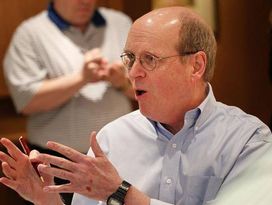BCS meetings preview
While spring football has been the focus of programs across the country on the field, the impending four-team playoff set to begin in 2014 has been the priority for college football administrators as a projected $500 million will be on the table for the sport annually beginning next season.
 BCS boss Bill Hancock is gathering with conference commissioners this week.
BCS boss Bill Hancock is gathering with conference commissioners this week.
The major question heading into the gathering of conference commissioners this week at the BCS meetings in Pasadena, CA, is how the four teams for the new postseason system will ultimately be chosen. While BCS executive director Bill Hancock doesn't expect anything to be finalized this week, the composition of the committee will be discussed, with the group likely being comprised of 14 to 20 members from across the country.
It remains to be seen whether the committee members will be active in the sport or if they will be people who have been away from it the last few years. While having active members such as conference commissioners and athletic directors would be most reminiscent of how the NCAA tournament bracket is put together, bias would be prevalent. If committee members are retired individuals such as former commissioners and ADs but still well-respected because of their contributions to the sport, then there could be less reason to doubt their allegiances.
However, even if somebody such as Roy Kramer was on the committee — an individual who is one of the most-respected in the history of the sport — his SEC background could raise eyebrows for some. So there is no perfect solution. What we do know is that it would be very difficult to find people who know the game yet don't bring any connection to any school.
Choosing a committee is one monumental task, but what actual formula will be used in determining playoff participants? In addition to W/L record, the NCAA basketball committee has RPI and schedule strength to use in putting together the basketball bracket. It would seem that this playoff committee will have different types of data available to them, but it's unclear what factors will be used. Schedule strength almost assuredly will be used, as we have seen major-college teams try to schedule more difficult slates over the last several months. Thus, 'common sense' may be a bigger factor than anyone may have first thought, as the "Who have you played?" rationale could be applied. And that's not such a bad thing despite college football scheduling being unbalanced, unlike other sports. While a more subjective approach for this new system may not be what everyone desired, it will be a welcome change from the numbers-based model offered by the BCS.
At the end of this week, we'll know the name of the new system (it won't be named the BCS), which site officially will host the first national championship game of the new structure on January 12, 2015, as well as the cities that will host the first two semifinal games in each of the first three years of the rotation, and we'll also get a better idea of who will be on the selection committee and how it might work.
So after several years of coaches, players, fans, members of the media and many others being upset at computers matching up teams for the BCS title game, that challenge will be met by a committee. Thus, there's no denying that the committee's makeup is of utmost importance, so the eyes of the college football world are on Pasadena this week.